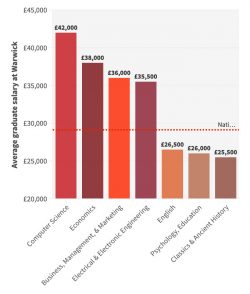Warwick graduates earning more than other students in nearly every subject
Figures from the Higher Education Statistics Agency (HESA) have revealed that most Warwick graduates earn more than students from other universities, boasting graduate salaries above their national subject average.
Data compiled by The Sunday Times showed that, across 71 courses, the earnings of Warwick graduates eclipsed the national average in all but three.
Computer science graduates are the best performers at Warwick, earning £40,000 on average 15 months after leaving university – £12,000 above the national median salary for the subject.
Humanities students, however, are still left lagging behind their STEM counterparts, with most arts and social science graduates at Warwick earning below the overall national average salary for 22-to-29-year-olds (£29,120).
Warwick still ranks as the joint-sixth highest Russell Group university for graduate salary prospects
Classics and ancient history students represent the lowest earners after graduation at Warwick, with a median graduate salary of £25,000 – over £4,000 less than the national average.
In a double blow to classics students, it is also one of three courses at Warwick — alongside social work and education — where graduate salaries fall below the national average for their subject.

Source: Higher Education Statistics Agency / The Sunday Times
Despite this disparity between students, Warwick still ranks as the joint-sixth highest Russell Group university for graduate salary prospects. The University’s median graduate salary of £32,500 places it alongside King’s College London, and above the likes of Durham, Exeter, and Edinburgh.
These findings have been celebrated by the University, with a spokesperson telling The Boar: “It is positive that overall, Warwick graduates have one of the highest median salaries [in the country].”
The HESA survey of 382,000 graduates in the 2021–22 academic year may still raise concerns for some students with the emerging inequality between STEM and humanities students nationally.
The University aims to support all Warwick students to develop […] their own vision of future success
University spokesperson
Graduates of a drama, dance, and cinematics course at Bristol, which was found to be the lowest-earning degree in the country (£19,184), took home salaries two-and-a-half times less than their university’s highest earners (dentistry, at £45,000).
While appreciating the issues raised, a spokesperson for Warwick said that: “Career paths and graduate salaries can vary significantly between sectors and each student’s definition of a meaningful career path is personal to them.
“The University aims to support all Warwick students to develop, explore and achieve their own vision of future success.”
As competition for high-paying jobs increases, another pertinent concern for British students is that “having a degree is not enough”. Recent ONS figures show that a third of university graduates are not in ‘high-skilled’ employment, which is perhaps a symptom of the growing belief among employers that work experience is more important than a degree.
Stephen Machin, Director of the Centre for Economic Performance at the London School of Economics, told The Sunday Times that he did not find the HESA data “surprising”. Rather, he believed: “It is perhaps surprising that some young people are still enrolling on these degrees, but maybe they do not know the salary outcomes.”
While Warwick students can take some solace in the fact that their salaries generally rank above that of other graduates nationally, the University has stressed that support is in place to help students boost their career prospects post-graduation.
Help from the University includes “opportunities to connect with employers from a broad range of sectors”, “access to thousands of job vacancies targeted at Warwick students”, and “support for work experience, including a work experience bursary.”
A spokesperson added that students are also encouraged to “complete the Warwick Award to make the most of their time at Warwick and develop skills employers look for in addition to academic excellence”.

Comments